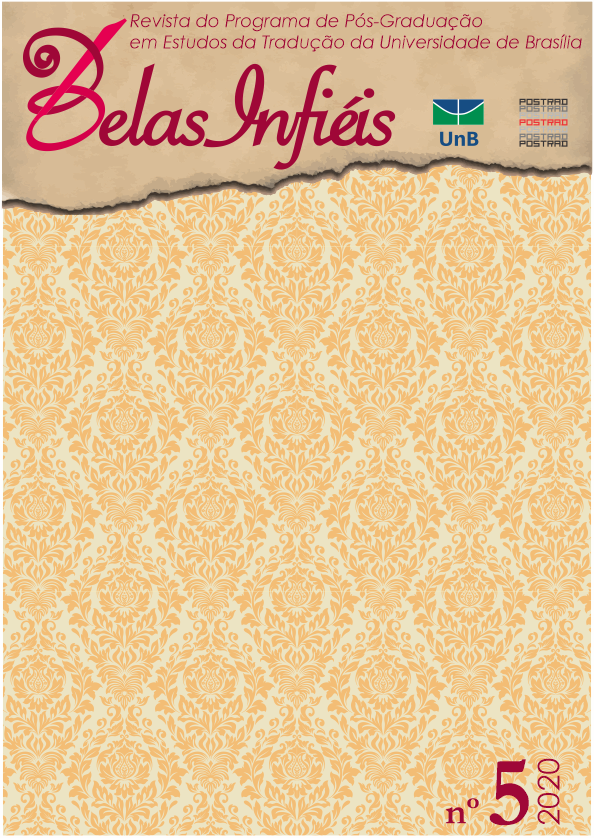Uma proposta de tradução etnográfica para Malinche: Descrevendo deidades mesoamericanas
DOI:
https://doi.org/10.26512/belasinfieis.v9.n5.2020.27154Palabras clave:
MALINCHE. Laura Esquivel. Deidades mesoamericanas. Perspectiva etnográfica. Tradução.Resumen
Este trabalho consiste em comentar a experiência tradutória de descrição das deidades cultuadas por povos pré-hispânicos do território mesoamericano antes da invasão castelhana no século XVI que estão presentes em MALINCHE (2006), obra literária da escritora mexicana Laura Esquivel. Os comentários fundamentam-se na perspectiva etnográfica descritiva de François Laplantine, na qual a tarefa de traduzir é abordada não como um mecanismo de substituições e correspondências entre palavras, mas como um espaço oportuno para um encontro e interação de culturas e línguas. Assim, foi necessário refletir sobre as modificações que devem sofrer o olhar do sujeito-tradutor sobre si mesmo, com o propósito de não encarar o outro como desvio ou espanto. A tarefa exige da tradução da referida obra literária um propósito que seja capaz de olhar de que maneira serão plasmados os valores espirituais pré-hispânicos na língua da tradução a fim de situar o “outro” pertencente um locus cultural distinto. Neste sentido, propõe-se apresentar a descrição como um recurso válido de tradução uma vez que ela promove os olhares mútuos entre culturas distintas. A tradução-descritiva torna-se o objeto de observação da observação, fazendo ver os limites e também as grandes extensões que permite um tradutor alcançar em seu caráter performático.
Descargas
Citas
I. Do artigo
BERMAN, Antoine. A tradução e a letra ou o albergue do longínquo. Traduzido por: Marie-Hélène Catherine Torres, Mauri Furlan, Andréia Guerini. Rio de Janeiro: 7 Letra /PGET, 2007. Tradução de: La traduction et la lettre, ou L’auberge du lointain.
ESQUIVEL, Laura. MALINCHE. São Paulo:Ed. Suma de Letras, 2006.
HERNÁNDEZ GONZÁLEZ, Cristina. Doña Marina (la Malinche) y la formación de la identidad mexicana. Madri: Ed. Encuentro Ediciones, 2002.
LAPLANTINE, François. A descrição etnográfica. Traduzido por: João Manuel Ribeiro Coelho. São Paulo: Terceira Margem, 2004. Tradução de: La description ethnographique.
LEÓN-PORTILLA, Miguel. Códices. Os antigos livros do Novo Mundo. Traduzido por: Carla Carbone. Florianópolis: Ed. da UFSC, 2012. Tradução de: Codices: los Antiguos Libros del Nuevo Mundo.
PAZ, Octavio. El laberinto de la soledad. Fondo de cultura económica: México, 1998.
II. Das descrições etnográficas
FAMSI. Fundación para el Avance de los Estudios Mesoamericanos. Disponível em: http://www.famsi.org/spanish/research/graz/borgia/thumbs_0.html Acesso em:
set. 2020.
FAMSI. Fundación para el Avance de los Estudios Mesoamericanos. Disponível em: http://www.famsi.org/spanish/research/graz/borbonicus/thumbs_0.html Acesso em: 5 set. 2020.
FLORESCANO, Enrique. Los orígenes del poder en Mesoamérica. México: FCE, 2009.
Descargas
Publicado
Cómo citar
Número
Sección
Licencia
Derechos de autor 2020 CC BY

Esta obra está bajo una licencia internacional Creative Commons Atribución 4.0.
Copyright Statement
Given the public access to this journal, the texts are free to use but requires the recognition of the original authorship and initial publication in this journal to be properly stated.
The journal allows the use of works published for non-commercial purposes, including the right to submit the work to publicly accessible databases. Published contributions are the sole and exclusive responsibility of the author(s).
- When submitting papers to be evaluated by the Belas Infiéis journal, the author(s):
- Declare that the contents of the contributions are original and of their original creation, being entirely responsible for their content if there is an objection by third parties.
- Claim to be aware that they should not commit academic plagiarism.
- Declare that the manuscript has not been published, completely or partially, in Portuguese or another language. If it is a translation it should be submitted to the Translated Articles section.
- Declare that the manuscript is not being evaluated by other journals.
- Declare that the manuscript was not submitted to another journal simultaneously.
- Commit(s) to inform the journal of any kind of error or inaccuracy in their contribution (published, in evaluation or in editing) and to collaborate with the editors to make due corrections of the article (when in evaluation or editing) or erratum/retraction (after publication).
- Declare that there is no conflict of interest regarding the published work.
- Authorize its release if it is accepted for publication without any kind of monetary compensation.
- Agree to assign non-exclusive rights to publication to the magazine, remaining free to make their contribution available in other media as long as the publication of the first version in Belas Infiéis magazine is mentioned. They also authorize Belas Infiéis to assign their texts for reproduction in content indexers, virtual libraries and similar platforms.
- Maintain copyright and grant the journal the right of first publication, the work being licensed under theCreative Commons Attribution License.
- Is/Are allowed and encouraged to publish and distribute their work online after the editorial process, which may increase the impact and citation of the published work.
- Authorize the editorial team to make textual adjustments and to adapt the article to the publication rules, when necessary.



















